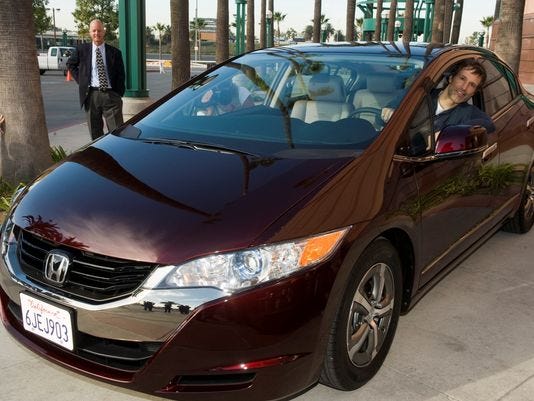They hope to cut costs and increase clout to lobby for more hydrogen service stations
Amid a revival in interest in hydrogen-powered cars, General Motors and Honda are announcing today that they are going to join forces to develop them.
Even before announcing they were combining, the two were already formidable competitors in the race to develop hydrogen fuel-cell technology that produces cars that emit only water vapor.
GM announced a series of hydrogen fuel-cell breakthroughs in the last decade before shifting its emphasis to developing electric cars like the Chevrolet Volt. Honda produced the hydrogen Clarity, a gorgeous car that was tested with average consumers.
GM, which says it has expertise in battery chemistry, holds the most patents involving the technology. Honda, which showed how to produce hydrogen fuel-cell cars, is second place on patents.
Now, GM and Honda will combine to produce a common power plant powered by hydrogen, which itself is usually produced from natural gas. They are trying to bring a product to market by 2020. Honda, on its own, will bring another version of its Clarity fuel-cell car to the U.S. by 2015. Besides standarizing components that both companies can use for their own models, the collaboration calls for trying to use the greater force to push for more hydrogen fuel stations. At present, they are mostly few and far between.
"This collaboration builds upon Honda and GM's strengths as leaders in hydrogen fuel cell technology," said GM CEO Dan Akerson, in a statement. "We are convinced this is the best way to develop this important technology."
Hydrogen fuel research reached a climax in the last decade before automakers seized upon electric power as the best way to produce a clean-fuel car. In the past year, automakers like Toyota and Mercedes-Benz have announced they are aggressively pursuing hydrogen. But it remains prohibitively expensive for the mass market, an issue that Honda and GM hope to tackle together.

No comments:
Post a Comment